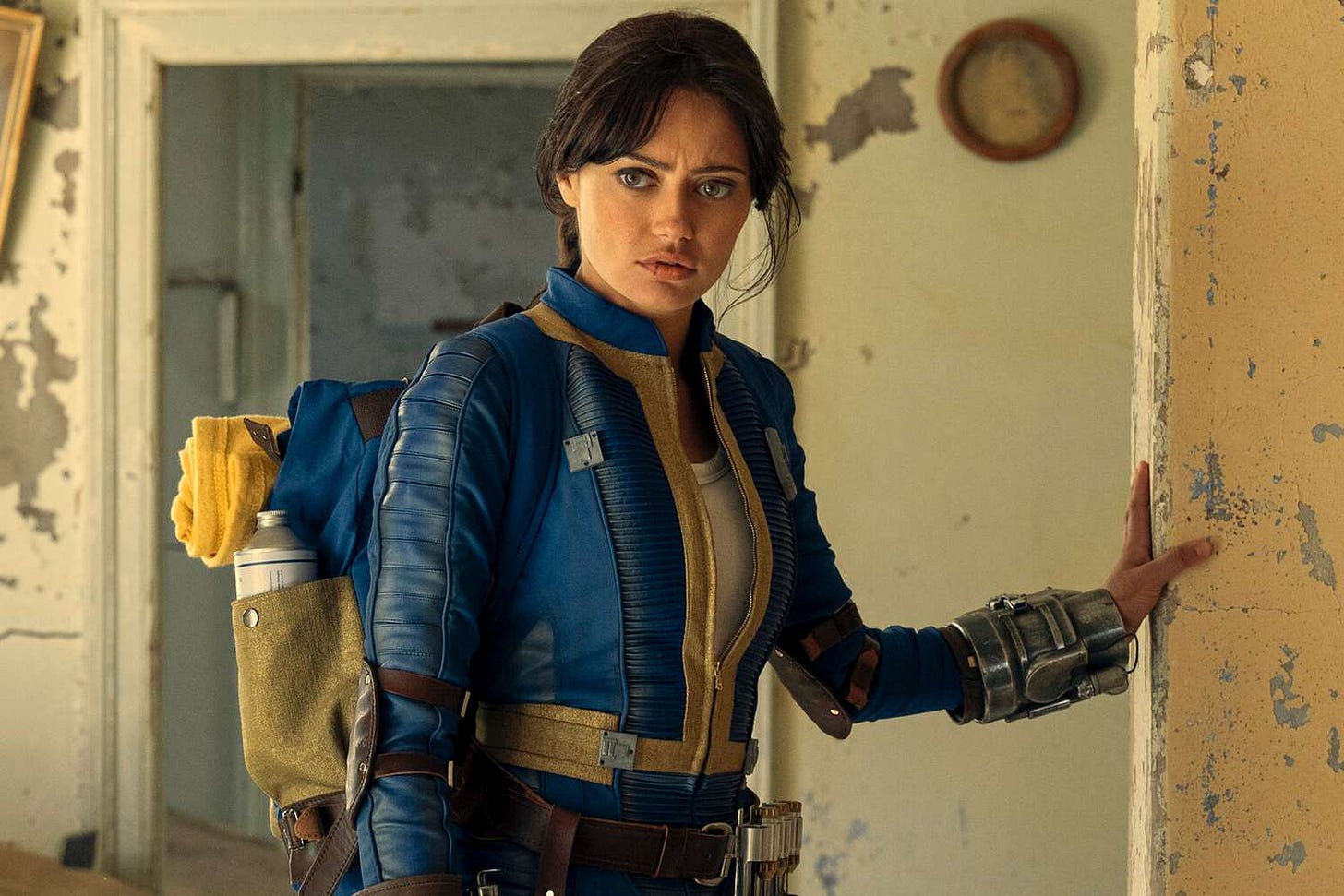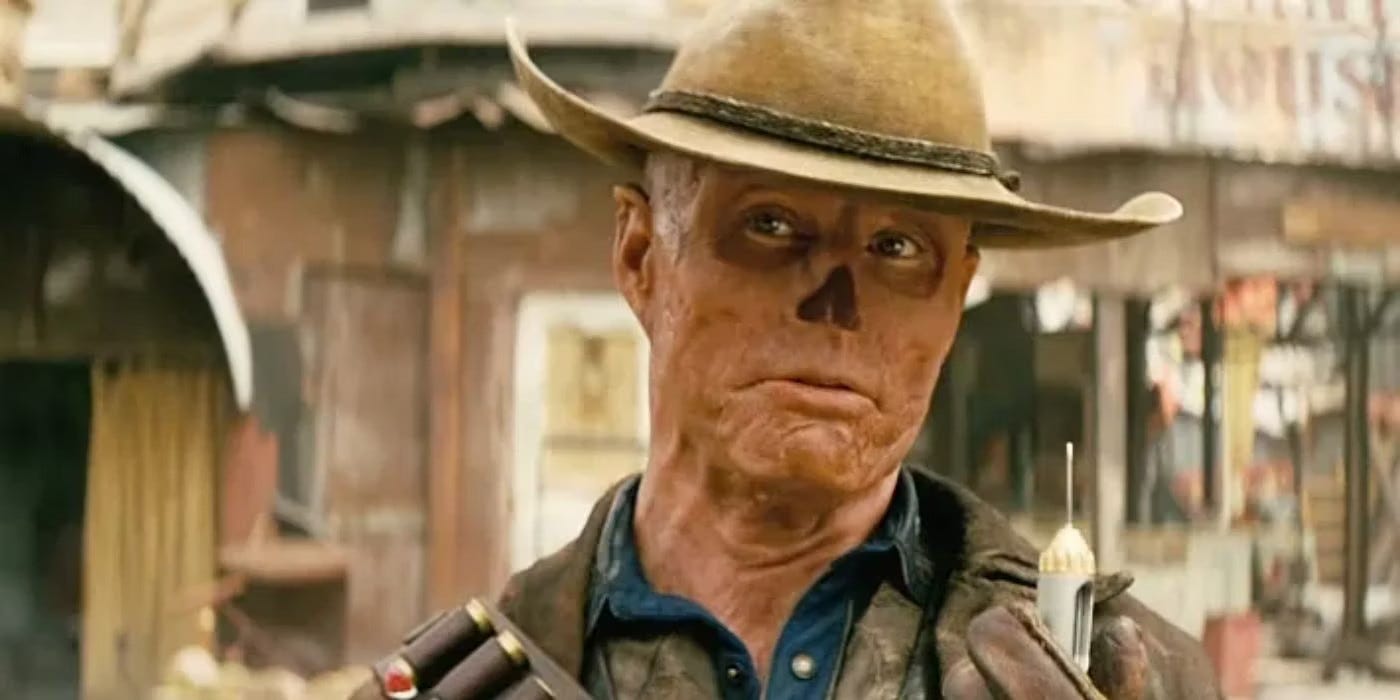‘Fallout’ and Making Serial Structures Work
Prime’s adaptation of a video game works because it’s really just three post-apocalyptic movies standing on each other’s shoulder wearing a coat.
NEW STANDARD DISCLAIMER: This newsletter aggressively spoils things.
Serial entertainment always ends in failure1. Always. It might take five episodes or seventeen seasons, but eventually entropy catches up to a serialized story and consumes it. Storylines get repetitive, characters grow stale, mysteries are solved in disappointing ways, reboots and resets fail to recapture that old charm2—in an infinite number of ways, any serialized story will collapse in on itself like a dying star if given enough time.
And, of course, some series don’t even get started, tripping at the starting line and knocking themselves cold. One of the biggest challenges for any series, but especially adaptations from other media, is bloat. Most series feel the need to offer up several storylines, multiple characters, and/or A-B-C plotting in each episode, and this can make them feel overstuffed and overly complex as viewers try to keep track of all the overlapping details and interconnected character back stories3.
And then there’s Fallout, Prime’s deliriously fun adaptation of the classic video game series. They started with a wide-open sandbox universe that could have become leadenly bloated from the get-go4, but they had a great idea about how to adapt what’s essentially an infinite story that is rich in detail and lore but pretty weak in plot and character: They treat all three of the main stories in the first season as essentially separate films that just happen to be edited together5.
Okey Dokey!
I’m a casual when it comes to Fallout6. I’m not a fan of RPG-style video games, and sandbox worlds often fatigue me more than anything else. I’m a guy who likes to be placed firmly on a rail and pointed towards the puzzle I have to solve or the monsters I have to slaughter, and the only inventory I want to manage is ammunition and increasingly absurd weapons7. Character stats also give me flashbacks to my D&D days, which were not exactly high tide for the Jeff is Cool movement8. So the first two Fallout games completely passed me by without so much as a glance. Fallout 3 is fun, but not fun enough for me to get Fallout 4, so there we are.
The games are deep in lore, however, I’ll give them that. The retro-future post-apocalyptic setting and style is very well done, and the sandbox nature of it all has led to some really deep world-building. That served the series well, and the writers ultimately did a great job wrangling it all down to a coherent, focused narrative. And they did that by having three separate stories, essentially, that really only meaningfully come together in the final episode: You have Lucy (Ella Purnell), a chipper young woman9 born in a Vault—an underground bunker where human society has persisted—on a quest to rescue her father after he’s kidnapped by surface raiders10; you have The Ghoul (aka Cooper Howard, played the great Walton Goggins), a former Hollywood star turned into an immortal-ish creature by radiation, trying to claim a bounty and ultimately seeking the location of his wife and daughter; and you have Maximus (Aaron Moten), a squire in the Brotherhood of Steel—a sect of power armor-wearing warriors—who allows his knight to be killed and steals his armor11.
These stories intersect lightly, but you could pretty easily edit the series into three separate films focused on a single character. And this silo approach to the stories helps tremendously, because until the final episode you don’t have to keep track of a million connections and details. You just track three characters pursuing their three goals and coincidentally get to explore the wasteland and the backstory behind this jovial nuclear holocaust12. By the time you have to start making connections to stuff that happened centuries ago, you’re on pretty solid ground.
War Never Changes
This approach works because it contrasts the sprawl and complexity of the setting and back story with the relative simplicity of the three narratives. Each protagonist has a pretty straightforward goal, and pretty straightforward obstacles to overcome13. Two of them (Maximus and Lucy) lack a certain amount of knowledge of the world, which allows them to double as stand ins for the viewer, discovering the horrible truths about post-apocalyptic America alongside the rest of us. For most of the first season, it’s all pretty straightforward, and that’s a relief.
There is a fourth narrative centered on the mystery of Vault 33 in the wake of the violent attack that saw Lucy head out on her quest, but this is also pretty siloed, and serves to give us a lot of details about Vault life and the deeply-fucked up origins of the Vaults and everything Lucy thinks is home. By separating this from the other stories, the viewer never gets overwhelemed; every time the setting switches, you can just switch your attention and dive back in.
Too many series try to weigh down the viewer with mysteries and portents right out of the gate, assuming this is necessary to hold our attention14. This is almost always a mistake, because what actually holds our attention is always the same: Characters. If we care about their goals and struggles, we’ll care about your twisting, hand-crafted mysteries. If we don’t, we won’t. It’s that simple, and Fallout, rather improbably, seems to understand that15.
For now. Inevitably, all series succumb to all the worst tendencies of serial fiction, as noted above. Fallout will grow incrementally more complex, more interconnected, and more tangled as time goes on. At some point—it might be Season Two, it might be Season Eighteen—it will crush itself under the weight of its own bullshit16. But for now, it’s an example of streamlined serial storytelling that works much better than a video game adaptation has any right to.
As for me, I’m still holding out for a Half Life film, which will undoubtedly be the crowning achievement of humanity, quickly resulting in extinction as we all sigh in relief at a job finally done.
NEXT WEEK: Baby Reindeer works the POV harrowingly.
If you enjoy this newsletter, consider subscribing to my paid fiction Substack, Writing Without Rules: From the Notebook!
Just like we all die in the end. Except me. For some reason I have yet to figure out, I will be the exception.
Much in the same way every new haircut fails to make me as cute as I was when I was nine years old. Life is cruel.
It’s even worse in the Internet Age, when we’re expected to watch multiple series and webisodes, play multiple games, read books, and participate in a toxic online forum culture just to get the lore straight. Life is exhausting.
Which pretty much describes Fallout 3, amiright?
This is also how I remember my weekends, which tend to make very little narrative sense.
Actually, I’m a Casual when it comes to everything. Title of my memoir? The Casual. I like it.
Plus, give me NoClip and God Mode or I refuse to play your game.
Still waiting for that particular Era, though hopes remain high.
The line “Golden Rule, motherfucker” is up there in my all-time great one-liners, in fact.
As one does. Surface raiders have stolen so many of my cats at this point I think maybe I should stop leaving my door unlocked at night.
This felt like a very Jeff moment, as I would also plot to steal power armor if I had the chance. And then I’d breakdance in it, and finally become a star.
In the case of Maximus, that obstacle is pretty much himself, which makes me feel very seen.
Much the same way I always try to quote poetry, demonstrate physical strength, and breakdance every time I meet new people. My charm is overwhelming. That’s the only explanation.
To say that my expectations about this series were low is the understatement of the year.
Just like me in about five years if we switch the word bullshit with hoarded books.





